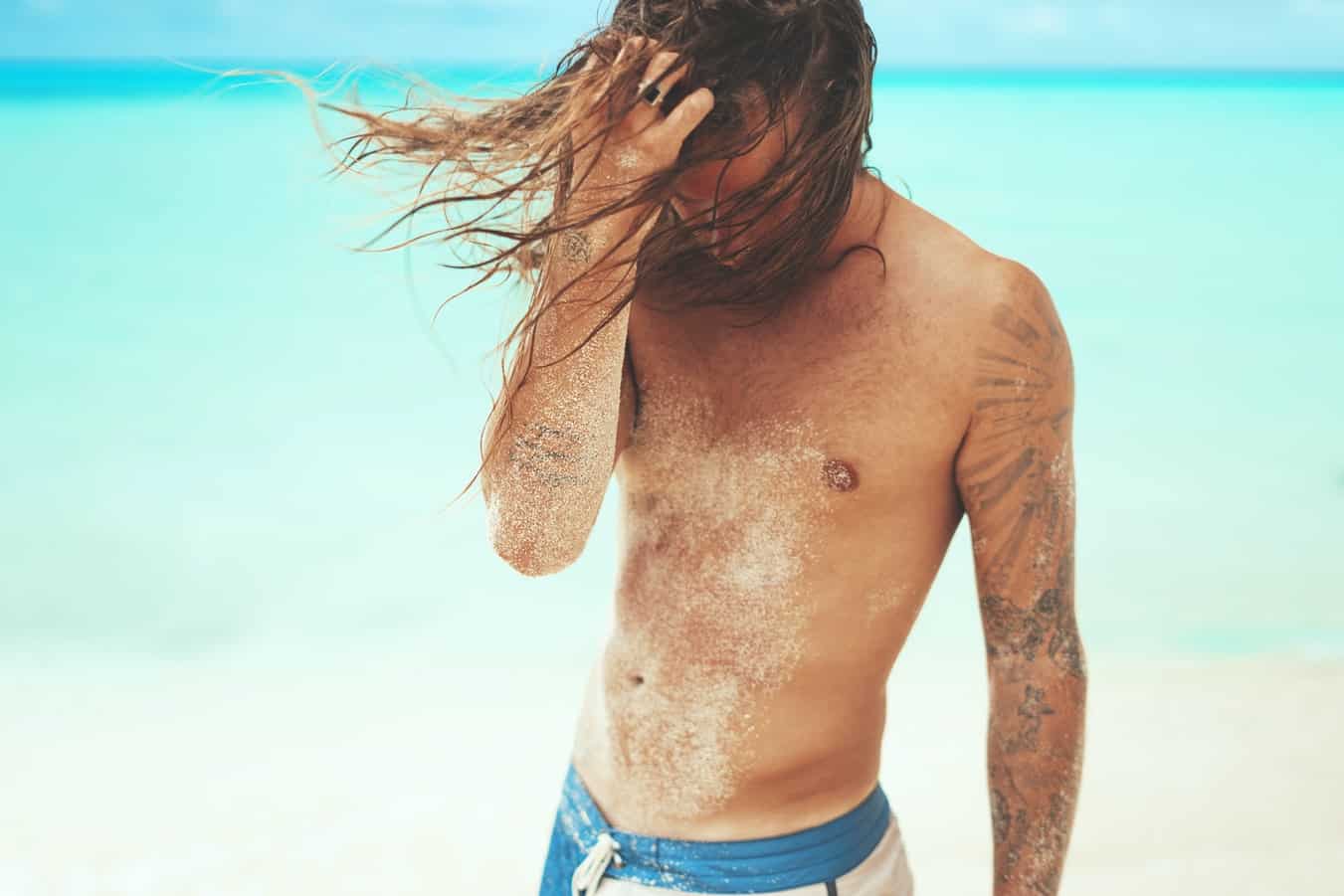There’s nothing quite like time in the sun, except maybe surfing in the sun. Getting your vitamin D and catching waves, the perfect summer.
But while a day out surfing is great for your body and mind, it can wreak havoc on your hair. You already know the sun damages your skin, but what about your hair?
Both the sun and the saltwater dry out and damage your hair.
Sun and saltwater may be good for the soul, but they can cause damage to your hair, especially if that hair is color treated or otherwise compromised. The sun’s UV rays beat down on your hair just like your skin.
While your skin produces more melanin when in the sun, your hair bleaches, turning lighter. Although that may sound cool, it’s actually a sign of sun damage.
This bleaching dries out your hair, causing it to turn dull and brittle. If your hair is already colored or bleached, this damage will be intensified causing more breakage.
The saltwater won’t lighten your hair, but salt from the ocean does leach any moisture in it, causing hair to turn rough and dry as well.
Dry, brittle hair means breakage and split ends. The more breakage, the thinner your hair appears and the more frizz you’ll see.
In addition to this, once split ends happen, they can’t be mended, despite what haircare advertisers will tell you.
Products can make the hair feel better, but those ends will have to be cut off to prevent more breakage and splitting.
Luckily though, all is not lost and you don’t have to choose between surfing and healthy hair. There are plenty of ways to prevent and mitigate damage to your hair while still enjoying the surf.
Wear a Hat
While you may not be able to wear a hat while you’re out on the waves, be sure to bring one for when you’re sitting on the shore.
A hat is the easiest and simplest way to protect your hair from the drying UV rays. Go for something wide brimmed so the shadow covers more of your hair.
You can’t prevent your hair from being in the sun while on the waves, but the more time you’re able to cover it, the better, and hats are a chic and easy way to do it.
Bring an Umbrella
Umbrellas are basically like the ultimate hat. Bring a beach umbrella when you’re heading down to go surfing.
Not only will it provide a nice shaded space when you head back to shore, but you’ll be protecting your hair from harsh UV rays. An umbrella covers more space than a hat so you’ll be better covered.
You can find umbrellas at most stores during the spring and summer at inexpensive prices, making them a good addition to your beach gear repertoire.
UV Protection
You (hopefully) wear sunscreen on your body, but did you know you should be using it for your hair too?
In addition to hats and umbrellas, use a UV protection spray on your hair! This option will help you out in the waves by providing protection while in the water.
Spray some onto wet or dry hair before you head out. Reapply anytime you come to shore.
Bumble and Bumble and Sun Bum make two great protection products.
Bumble and Bumble’s Hairdresser’s Invisible Oil Primer offers great UV protection along with lots of moisture. Perfect for color treated, or already blonde hair that may already suffer from dryness or breakage.
Sun Bum’s Hair and Scalp Spray comes at an SPF 30 making it a solid sunscreen for your hair. Either way, sun protection for your strands is vital when out at the beach.

Don’t Forget Your Scalp
Your strands themselves aren’t the only part of your head that needs attention. Your scalp is vulnerable to sunburn when you’re out surfing or having fun on the beach.
When your hair is dry, it provides some protection to the scalp by giving more physical coverage. When your hair is wet though, it clumps together and separates, leaving your scalp more exposed.
This skin isn’t used to seeing the sun and burns rather quickly. Protect this sensitive skin with it’s own sunscreen.
As previously mentioned, Sun Bum’s Hair and Scalp Spray in SPF 30 is perfect for scalp protection.
However, you don’t have to use a spray. If all you have is your regular sunblock, you can apply that straight to your scalp as well.
A healthy scalp leads to healthy hair by keeping your hair follicles clear of dead skin cells and damage so help keep it from getting burned.
Wet Your Hair Before Going In
Dry hair is essentially like a sponge in that it absorbs all the liquid. When it comes to saltwater, this is a negative.
The saltwater strips your hair of moisture leaving it feeling like straw. However, freshwater doesn’t harm your hair this way.
Before heading into the ocean, wet your hair at the showers for a fresh water rinse. It may seem strange to rinse off before actually going into the water, but it will help save your strands from the salt.
Using the sponge analogy, by wetting your hair with fresh water, you’re filling your sponge with a neutral or better substance that won’t harm the integrity of your hair. Then when you go out into the waves, the salt water can’t penetrate your strands.
Bring Some Conditioner
Bring a conditioner or a mask with you. After wetting down your hair and before applying your sunscreen, slather your hair with either a regular conditioner or a deep conditioning mask.
Freshwater will help keep saltwater from getting in your strands, but conditioner will seal the deal.
First off, conditioning your hair will provide it with better moisture. Properly moisturized hair has better elasticity or ability to stretch, has more shine and is overall stronger.
Conditioning your hair before going into the ocean helps give it these benefits as well as keeping salt water out of your strands.
If showers are inaccessible at your beach you can apply your conditioner to dry hair, but damp hair after a fresh water rinse is best.
Be sure to use a generous amount to ensure your hair is fully coated, especially the ends which are usually already dry.
Skip Hot Tools
Heat seriously dries out and damages your hair, so do your best to skip the blow dryer or the curling iron if you’re planning to spend time at the beach.
Your hair is already under enough stress from the sun and the water, it doesn’t need the extra abuse from hot tools.
Besides, after wetting your hair and applying conditioner, you don’t need to spend time heat styling your hair anyway. If you can, stay away from hot tools.
Protective Styles
You may not need to curl your hair, but you should still style it accordingly.
Wet hair is much stretchier than dry hair meaning it is also more susceptible to breakage.
Leaving your hair loose in the water causes the hair to rub against itself and your body while in this fragile state, causing more damage and breakage to the hair.
Instead, try a protective style, like braids or a bun. Be sure to leave braids on the loose side and tie hair with a scrunchie over an elastic band.
Elastic bands leave too much pressure on the hair, also causing breakage when the hair is wet and weak. Scrunchies give a little extra protection with their fabric covering.
Towel Gently
Never rub your hair with a towel! We’ve already covered how fragile wet hair is and how breakage can occur from it rubbing against itself.
Now magnify this times twenty when you go to rub it with a cloth towel. Instead, scrunch and squeeze your hair to remove excess moisture.
This applies less friction to the hair, leaving it intact and healthy. Plus, scrunching will bring out natural waves, helping you to perfect the sought after “beachy look.”
Clarify… But Sparingly
In addition to things you should do while at the beach, there’s also things you should do at home as part of your hair care routine to keep it healthy from the sun and ocean water.
The first being to clarify your hair regularly. Clarifying shampoos are strong shampoos formulated to remove buildup from the hair.
Sunscreens and saltwater will leave residues on your strands that need to be removed periodically to ensure healthy hair.
Without clarifying, moisturizing products are unable to penetrate the strand, leaving it to sit on top of the hair while the inside stays dry and brittle. Clarifying is like prepping your hair for moisture.
Since clarifying shampoos are drying by nature, don’t use these more than once a week or once every other week, depending on how often you surf or how often you wash your hair.

Deep Condition
Invest in a quality deep conditioning treatment, both professionally and at home.
Stylists have access to professional products meant to give more long lasting results than at home care. So when you visit your stylist, see what moisturizing treatments they have to offer and utilize them.
R&Co moisture concentrate and Research In Beauty’s Rejuvenating Hair Treatment are two top professional treatments to ask about.
At home, use a hair mask at least every time you clarify. The clarifying shampoo will strip the mineral buildup on your hair leaving it prepped and primed for moisture, making it the perfect time to deep condition.
Oribe’s Gold Lust Masque or Virtue’s Restorative Treatment Mask are two great home treatments to try.
Stay Hydrated
Moisture starts from the inside out. Your biggest line of defense against sun and saltwater damaged hair is staying hydrated.
We may not think of our hair as needing hydration from the inside, but it does. Aim for at least eight glasses of water a day, or around sixty four ounces total.
Stay hydrated all day, but especially while at the beach. Bring a water jug with you so you always have access.
Shower ASAP
As soon as you finish surfing, rinse off at the beach showers, or head home to shampoo.
You already know that saltwater is drying and damaging to the hair strand, but letting it dry into the hair is even more so. Just like you wet your hair with fresh water before heading into the surf, rinse out the saltwater after your session.
Rinsing off in the showers is good and will be enough if you don’t have shampoo or aren’t able to head home immediately, but if you can, shampoo.
Shampooing your hair will fully remove the saltwater and minerals on your hair preventing more dryness.
Moisturize Moisturize Moisturize
If you haven’t realized by now, moisture is incredibly important to the health of your hair. Look for water based moisturizers and creams over oils.
Hair is hydrophilic or water loving so it’s better able to receive these kinds of moisturizers. Oils work as a sealant on the hair, giving it a coating.
Therefore they work best used over already moisturized hair, locking it in.
Try Oribe’s Supershine Moisturizing Cream or Evo’s Happy Campers for water based leave in conditioners. Then apply an oil like Bumble and Bumble’s Invisible Oil over to seal it in.
Moisturized hair has more bounce, shine and strength, meaning it’s overall healthier.
Get a Trim
Lastly, the best way to get healthy hair while going in the sun and surfing is to cut it.
Once you have split ends and breakage, no product will actually heal it. Products can mask damage, but it will still be there and continue to worsen until it’s cut off.
If you don’t heat style much but spend a lot of time in the sun and out in the ocean surfing, you should cut your hair at least every twelve weeks, or four times a year.
If you do more to your hair or color it often, aim for a cut every six to eight weeks to keep it healthy.
Keeping your hair healthy outside of the beach is the best way to help keep it healthy when you’re out in the sun.
Related Questions
Is Saltwater Bad for Your Skin?
While the ocean water isn’t great for your hair, it can actually be good for your skin. Yes the ocean will dry out your skin, but it’s also high in magnesium and potassium, which are good for your skin.
Saltwater can also help in exfoliation by removing dead skin cells, as well as stimulate your circulation.
Is surfing bad for your hair?
Surfing isn’t necessarily bad for your hair, but it is hard on your hair. The saltwater and sun cause stress to strands which need to be taken care of.
However, surfing itself isn’t bad for your hair.


